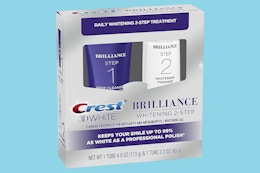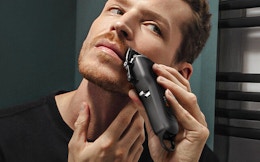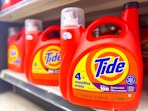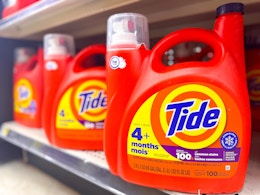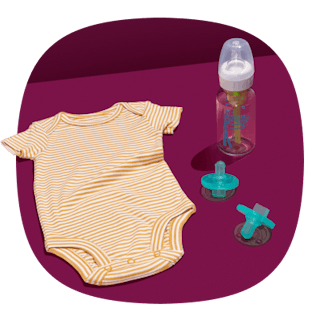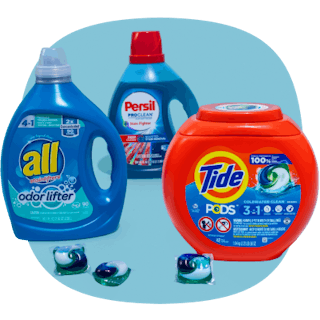We rely on the products we bring into our homes to be safe for us and our families. But sometimes issues arise and products have to be recalled from store shelves. Keeping track of all the product and food recalls that occur can be a big task, so we’ve created this list to help keep you in the loop on the latest food and household products and consumer packaged goods recalls.
If it’s a food recall, a recall of household appliances, or a recall of a personal care item that has national reach, we’ll include it in this list. By bookmarking this article, you’ll have quick and easy access to all the recall information you need to stay informed. We’ll be updating this as new recalls occur. Since many recalls end up in court, be sure to stay on top of the latest class action settlements too.
Here’s the list, organized by the month the recall is announced.
If you’re not couponing yet, you’re missing FREE deals. Download the KCL app now .
What's on this page:
- ByHeart Whole Nutrition Infant Formula Cans and Anywhere Packs
- Peloton Original Series Bike+ Exercise Bikes
- October 2025 Product Recalls
- September 2025 Product Recalls
- August 2025 Product Recalls
- July 2025 Product Recalls
- June 2025 Product Recalls
- May 2025 Product Recalls
- February 2025 Product Recalls
- January 2025 Product Recalls
- Past Product Recalls (December 2023 - 2024)
December 2025 Product Recalls
INIU Recalls Power Banks
Dec. 5: INIU is recalling power banks due to the potential for them to overheat, posing fire and burn hazards.
Products affected: About 210,000 INIU 10,000mAh model BI-B41 portable power banks that come in a black or blue case and have a paw-print LED light and the INIU logo on the front. The serial numbers included in this recall are 000G21, 000H21, 000I21, and 000L21. These power banks were sold at Amazon.com from Aug. 2021 - April 2022.
What to do if you have the products: Stop using the product immediately. Contact INIU to verify your product and register to get a full refund. It's dangerous to throw lithium-ion batteries away along with household garbage. For disposal, check if your local Home Depot, Lowe's and Staples takes lithium-ion batteries or find a household hazardous waste collection center that will accept them.
For more information, questions, or concerns about this recall, contact consumer service at (888) 886-3606. (8 a.m. - 5 p.m. ET, Mon. - Fri.) or by email at recall@iniu.shop. You can also visit https://iniushop.com/pages/recall-b41# or https://iniushop.com and click "Product Recalls".
HydroJug Recalls 14-Ounce Children’s Sport Tumblers
Dec. 4: HydroJug is recalling 14-ounce Children's Sport Tumblers due to the potential for the handle to come loose and detach, posing a choking hazard to children.
Products affected: About 17,000 14-ounce HydroJug Children's Sport Tumblers with the serial #235010 under the rubber boot. Some recalled tumblers do not have a serial number. There are five patterns included in this recall: Bows, Cowgirl, Daisy Checkers, Dinosaur, Sport. The tumblers were sold at Academy Sports, Basin Sports, Bucks Ace, Combined Sales Company, Gordons Ace Hardware, Kents Grocery, Scheels, and online at Amazon.com, Hydrojug.com, iHerb.com, and Well.ca from May - June 2025.
What to do if you have the products: Stop using the recalled product immediately. Contact HydroJug (see below) for a replacement lid. You'll need to provide your order details (if available), shipping address, and photos of the bottom of your tumbler(s) showing the serial number or no serial number. You'll also have to include a photo of the recalled tumbler lid with "Recalled" written on it in permanent marker.
For more information, questions, or concerns about this recall, contact consumer service via email at service@thehydrojug.com.
November 2025 Product Recalls
Ozark Trail Tabletop 1-Burner Butane Camping Stoves
Nov. 26: Walmart is recalling Ozark Trail Tabletop 1-Burner Butane Camping Stoves because they can explode or catch fire, posing a burn or fire hazard.
Products affected: About 201,000 Ozark Trail Tabletop 1-Burner Butane Camping Stoves sold at Walmart stores and Walmart.com
What to do if you have the products: Stop using the recalled product immediately. Return the stove to any Walmart store for a full refund.
For more information, questions, or concerns about this recall, contact Walmart consumer service at (800) 925-6278 (7 a.m. - 9 p.m. CT) or visit www.walmart.com/help or https://corporate.walmart.com/recalls.
Ambriola, Boar's Head, Locatelli, Member’s Mark, and Pinna Grated Cheeses
Nov. 25: The Ambriola Company is recalling cheese products due to possible Listeria contamination.
Products affected: Ambriola, Locatelli, Member’s Mark, Pinna, and Boar’s Head cheeses sold at retailers, including Sam's Club, Walmart, and Wegmans. Here are the recalled products and their expiration dates.
Retail Products
Boar’s Head Grated Pecorino Romano 6 oz. cup
-
03/04/26, 03/12/2026
Locatelli Pecorino Romano Grated 4 oz. cup
-
05/03/26, 05/10/26, 05/17/26
Locatelli Grated Pecorino Romano 8 oz. cup
-
04/06/26, 04/11/26, 04/12/26
-
04/15/26, 04/17/26, 05/05/26
-
05/06/26, 05/07/26, 05/10/26
-
05/12/26, 05/14/26, 05/17/26
Member’s Mark Pecorino Romano 1.5 lb. Bag
-
03/25/26, 03/30/26, 04/05/26
Grated Product Sold by the Pound
Ambriola Grated Pecorino Romano
-
02/28/26, 03/04/26, 03/11/26
Boar’s Head Pecorino Romano Grated bag
-
03/03/26, 03/12/26
Locatelli Grated Pecorino Romano
-
03/04/26, 03/06/26, 03/11/26, 03/13/26
Pinna Grated Pecorino Romano
-
03/11/26
What to do if you have the products: Do not consume. Discard or return the recalled product to the place of purchase for a full refund.
For more information, questions, or concerns about this recall, contact consumer service at (800) 962-8224. (9 a.m. - 4 p.m. ET, Mon. - Fri.).
Belkin Portable Power Banks and Wireless Charging Stands
Nov. 13: Belkin is recalling Portable Power Banks and Wireless Charging Stands due to the potential for them to overheat, posing fire and burn hazards.
Products affected: About 83,500 Portable Power Banks and Wireless Charging Stands sold at Best Buy, Target, Walmart, and other retailers nationwide, online at Amazon.com, Belkin.com, and on Tiktok from Aug. 2020 - Aug. 2025.
-
Recalled Portable Power Banks have model numbers BPB002 (sold in black) and PB0003 (sold in black and white) with serial number 35S displayed on the back of the power bank.
-
Recalled Wireless Charging Stands have the model number MMA008 with a serial number that begins with 57X (find the serial number on the bottom of the stand).
What to do if you have the products: Stop using the recalled product immediately. Contact Belkin (see below) for a full refund or store credit. You'll need to submit photos of the front and back of your recalled product. It's dangerous to throw lithium-ion batteries away along with household garbage. For disposal, check if your local Home Depot, Lowe's and Staples takes lithium-ion batteries or find a household hazardous waste collection center that will accept them.
For more information, questions, or concerns about this recall, contact consumer service at (800) 223-5546 (9 a.m. - 9 p.m. ET, Mon. - Fri.) or visit http://www.belkin.com/BPB002recall or http://www.belkin.com/MMA008recall or at https://www.belkin.com/ and click on "Product Recalls".
Zippee Silicone Activity Toys
Nov. 13: Mobi Games is recalling Zippee Silicone Activity Toys because the spherical ends can reach the back of a child's throat, posing a choking hazard.
Products affected: About 117,500 Zippee Silicone Activity Toys sold at specialty toy stores, Amazon.com, PlayMobi.com and other online platforms from Nov. 2019 - Jan. 2024. The recalled toys may have a date code ranging from 030620 to 110823 inside the silicone cylinder body of the toy.
What to do if you have the products: Stop using the recalled products immediately. Contact Mobi Games (see below) for a full refund.
For more information, questions, or concerns about this recall, contact consumer service via email at recall@playmobi.com or visit www.playmobi.com/pages/product-recall or www.playmobi.com and click "Product Recalls".
ByHeart Whole Nutrition Infant Formula Cans and Anywhere Packs
Nov. 11: The initial voluntary recall of two batches was announced on Nov. 8 due to an outbreak of infant botulism. However, ByHeart has recently announced an expand to all batches of their infant formula nationwide.
Product(s) affected: All batches of the ByHeart Whole Nutrition Infant Formula cans and all Anywhere Packs are included in this recall.
What to do if you have the product(s): Immediately discontinue use. Dispose of the product. If you purchased the product(s) online at ByHeart.com on or after Oct. 1, 2025 you can get a refund for up to two items. First time customers can receive a full refund. You'll need to call (866) 201 - 9069 (team members are available 24/7). If you purchase ByHeart infant formula from any retailer, including Amazon, Walmart, and Target, you'll need to contact your local store for refund details.
For more information, questions, or concerns about this recall, contact consumer service at (833) 429-4327. Team members are available 24/7. You can also contact customer service at: hello@byheart.com.
Peloton Original Series Bike+ Exercise Bikes
Nov. 6: Peloton is recalling Peloton Original Series Bike+ Exercise Bikes due to the potential for the seat to break or detach during use, possibly causing the user to fall.
Product(s) affected: 833,000 Peloton Original Series Bike+ Model PL02 Exercise Bikes that were sold nationwide at Peloton and Dick's Sporting Goods stores, and online at onepeloton.com, Amazon.com, eBay.com, and DicksSportingGoods.com between Jan. 2020 - April 2025. The products affected have a serial number that begins with the letter "T". You'll find the serial number behind or inside the front fork or behind the flywheel.
What to do if you have the product(s): Stop using the exercise bike and contact Peloton for a free seat post you can install.
For more information, questions, or concerns about this recall, contact Peloton at (866) 679-9129 (6 a.m. - midnight ET Mon. - Fri.) or online at Support.OnePeloton.com or OnePeloton.com (click Product Recalls at the bottom of the page).
October 2025 Product Recalls
Golden Island Korean BBQ Pork Jerky
Oct. 24: LSI, Inc. is recalling Golden Island Korean BBQ Pork Jerky due to possible foreign matter contamination.
Product(s) affected: About 2,277,540 pounds of Golden Island Korean BBQ Pork Jerky sold nationwide at Costco and Sam's Club warehouses. The product comes in 14.5- and 16-ounce plastic pouches with an establishment number M279A and BEST BY dates that range from Oc. 23, 2025 to Sept. 23, 2026 (on the side of the packaging). Here's the full list of recalled products.
What to do if you have the product(s): Do not consume. Discard the product or return it to place of purchase for a refund.
For more information, questions, or concerns about this recall, contact customer service via email at info@goldenislandjerky.com.
Ben's Original Long Grain White, Whole Grain Brown, and Long Grain & Wild Ready Rice Products
Oct. 10: Ben's Original is recalling Ben's Original Long Grain White, Whole Grain Brown, and Long Grain and Wild Ready Rice due to possible contamination of small stones.
Product(s) affected: The recalled Ben's Original Rice products have a Best Buy date of 8/2026. Here are the batch codes and where the recalled products were sold.
-
Ben's Original Ready Rice Long Grain White Rice
-
534AMGRV22, 534ALGRV22 Sold at: H-E-B
-
-
Ben's Original Ready Rice Whole Grain Brown Rice
-
533ELGRV22, 534BMGRV22 Sold at Target
-
534DMGRV22 Sold at H-E-B
-
-
Ben’s Original Ready Rice Long Grain & Wild Rice
-
533BMGRV22, 533CLGRV22 Sold at United Markets
-
533CMGRV22 Sold at: H-E-B, Amazon, and Piggly Wiggly
-
What to do if you have the product(s): Do not consume. Contact the Ben's Consumer Care team (see below) for returns.
For more information, questions, or concerns about this recall, contact Ben’s Original Consumer Care at (800) 548-6253 (8 a.m. - 8 p.m. CT Mon. - Fri. and 8 a.m. - 4 p.m. CT, Sat. - Sun.).
Sprouts Farmers Market Smoked Mozzarella Pasta Salad
Oct. 8: Sprouts Farmers Market is recalling Smoked Mozzarella Pasta Salad due to potential for Listeria contamination in connection with the pasta recall by Nate's Fine Foods earlier this year.
Product(s) affected: Sprouts brand Smoked Mozzarella Pasta Salad sold at Sprouts stores in AL, AZ, CA, CO, DE, FL, GA, KS, LA, MD, MO, NC, NJ, NM, NV, OK, PA, SC, TN, TX, UT, VA, WA, and WY. Recalled products were packed directly at the deli counter or sold from the Grab & Go section. Here is the identifying information for recalled products:
-
Sprouts Smoked Mozzarella Pasta Salad (Grab & Go): UPC 2‑15786‑00000, Use By Dates: 10/10/25 – 10/29/25
-
Sprouts Smoked Mozzarella Pasta Salad (Deli Counter) UPC 2‑15587‑00000, Use By Dates 10/10/25–10/29/25.
What to do if you have product(s): Do not consume. Dispose of or return the product(s) to Sprouts for a full refund. Clean/sanitize any surfaces the product(s) touched.
For more information, questions, or concerns about this recall, contact Sprouts Customer Relations by phone (480) 814-8016 (9 a.m. - 4 p.m. MT, Mon. - Fri.).
Foster Poultry Farms Chicken Corn Dogs and Ground Turkey On a Stick Products
Oct. 4: Foster Poultry Farms, LLC is recalling Chicken Corn Dog and Ground Turkey on a Stick products due to possible contamination with wood pieces in the batter.
Product(s) affected: Around 3,961,138 pounds of Foster Farms chicken corn dog products and around 118,098 of ground turkey on a stick products. The recalled products were sold at retailers and institutional locations, including schools nationwide. Here's the full list of recalled products. Check here for recalled product labels with their Best Buy dates, and other identifying information.
What to do if you have the product(s): Do not consume. Discard the recalled product(s) or returned to the place of purchase.
For more information, questions, or concerns about this recall, contact Foster Farms Consumer Affairs by phone (800) 338-8051 (8 a.m. - 5 p.m. PT, Mon. - Fri.) or by email at info@fosterfarms.com.
Kroger Basil Pesto Bowtie and Smoked Mozzarella Penne Deli Salads
Oct. 4: Kroger is recalling Basil Pesto Bowtie and Smoked Mozzarella Penne deli salads due to potential for Listeria contamination related to an earlier pasta recall by Nate's Fine Foods.
Product(s) affected: Basil Pesto Bowtie and Smoked Mozzarella Penne deli salads sold at deli counters/Grab‑and‑Go at Kroger banner stores (Baker’s, City Market, Dillons, Fred Meyer, Fry’s, Gerbes, King Soopers, Kroger, Payless, Ralphs and Smith’s) across AK, AL, AR, AZ, CA, CO, GA, ID, IL, IN, KS, KY, LA, MI, MO, MS, MT, NE, NM, NV, OH, OR, SC, TN, TX, UT, WA, and WV. Weights vary for the following recalled products:
-
Basil Pesto Bowtie Pasta Salad — UPC: 217573-10000, Sold On: Sept. 6 - Oct. 2, 2025
-
Basil Pesto Bowtie Pasta Salad — UPC: 217573-20000, Sold On: Sept. 6 - Oct. 2, 2025
-
Smoked Mozzarella Penne Salad — UPC: 227573-10000, Sold On: Aug.. 29 - Oct. 2, 2025
-
Smoked Mozzarella Penne Salad — UPC: 227573-10000, Sold On: Aug. 29 - Oct. 2, 2025
What to do if you have the product(s): Do not consume. Discard or return the product(s) to place of purchase for a full refund. Clean/sanitize any surfaces the product(s) touched.
For more information, questions, or concerns about this recall, contact Kroger Customer Service by phone (800) 233-5921 (8 a.m. - midnight ET, Mon. - Fri. or 8 a.m. - 9 p.m. ET, Sat. - Sun.).
Giant Eagle/Marketside District Smoked Mozzarella Pasta Salad
Oct. 3: Giant Eagle is recalling Smoked Mozzarella Pasta Salad due to potential Listeria contamination in connection with the pasta recall by Nate's Fine Foods earlier this year.
Product(s) affected: Prepared‑foods Smoked Mozzarella Pasta Salad sold at Giant Eagle & Market District in IN, MD, OH, and PA.
What to do if you have the product(s): Do not consume. Discard or return the product(s) to place of purchase for a full refund. Clean/sanitize any surfaces the product(s) touched.
For more information, questions, or concerns about this recall, contact Giant Eagle Customer Care at (800) 553-2324 (8 a.m. - 8 p.m. ET, Mon. - Fri.).
-
Smoked Mozzarella Penne Salad: Various sizes, Expiration Dates: 9/30/25 through 10/7/25, UPC: 256616000000
-
Smoked Mozzarella Penne Salad-Small: 4 lbs 8 oz, Expiration Dates: 9/30/25 through 10/3/25, UPC: 246511000000
-
Smoked Mozzarella Penne Salad-Large: 9 lbs, Expiration Dates: 9/30/25 through 10/3/25, UPC: 246512000000
For more information, questions, or concerns about this recall, contact Giant Eagle Customer Service at (800) 553-2324 (8 a.m. - 8 p.m. ET, Mon. - Fri.).
Albertsons Companies Store-Made Deli Items With Pasta
Oct. 1: Albertsons Companies is recalling store-made deli items with pasta (supplied by Fresh Creative Foods) due to potential Listeria contamination in connection with the Nate's Fine Foods pasta recall earlier this year.
Product(s) affected: Various pasta salads/meals made in-store and sold across Albertsons companies, Albertsons, Albertsons Market, Amigos, Andronico's Community Markets, Carrs-Safeway, Eagle, Pak 'N Save, Pavilions, Market Street, Randalls, Safeway, Tom Thumb, United, and Vons in AK, AZ, AR, CA, CO, HI, LA, NE, NV, NM, OK, SD, TX, UT, and WY. View the full list of recalled pasta products (includes Product Name, UPC, Size, Sell Thru Dates, Stores and States Sold At).
What to do if you have the product(s): Do not consume. Discard or return the product(s) to place of purchase for a full refund. Clean/sanitize any surfaces the product(s) touched.
For more information, questions, or concerns about this recall, contact Albertsons Companies' Customer Service at (877) 723-3929 (5 a.m. - 9 p.m. PT, Mon. - Fri.).
Demers Food Group (Scott & Jon’s) Shrimp Scampi With Linguini Bowls
Oct. 1: Demers Food Group is recalling Scott's & Jon's Shrimp Scampi with Linguini Bowls due to an ingredient recall by Nate’s Fine Foods for potential Listeria contamination.
Product(s) affected: 9.6-ounce Scott & Jon’s Shrimp Scampi with Linguini bowls with the following identifying information:
-
UPC: 858175003919
-
Lot Code: S254522, S255522, S259522, S263521, S263522
-
Best if Used By Date: 3/12/2027, 3/13/2027, 3/17/2027, 3/21/2027
-
GTIN: 10858175003916
What to do if you have the product(s): Do not consume. Discard or return the product(s) to place of purchase for a full refund. Clean/sanitize any surfaces the product(s) touched.
For more information, questions, or concerns about this recall, contact Demers Food Group's Customer Service at (800) 239-9731 (8 a.m. - 4 p.m. ET, Mon. - Fri.).
September 2025 Product Recalls
Evenflo Revolve360 Slim Car Seats
Sept. 30: Evenflo is recalling certain Revolve360 Slim car seats due to the potential for a child to access foam in the headrest, which could pose a choking hazard. The foam itself is non-toxic.
Product(s) affected: More than 324,000 Evenflo Revolve360 Slim car seats with model numbers that start with 3681 are part of this recall. You'll find the model number on the label on the back of the car seat.
What to do if you have the product(s): If your child has accessed the foam you need to register your car seat and request for a free repair kit. Note Evenflo will ship repair kits in November. Evenflo reports that "if the foam remains intact and out of reach" you can continue to use the car seat.
For more information, questions, or concerns about this recall, contact Evenflo ParentLink Consumer Care team by phone (800) 233-5921 (8 a.m. - 5 p.m. ET, Mon. - Fri.) or via email at parentlink@evenflo.com.
Trader Joe's Cajun Style Chicken Fettuccine Alfredo
Sept. 26: Trader Joe’s is recalling Trader Joe's Cajun Style Chicken Fettuccine Alfredo due to potential for Listeria contamination related to the pasta recall from Nate's Fine Foods earlier this year.
Product(s) affected: Trader Joe’s Cajun Style Chicken Fettuccine Alfredo sold in all stores AZ, CA, NV, NM, and UT. Recalled products has the Best If Used By Dates of 09/20/25 or later.
What to do if you have the product(s): Do not consume. Discard or return the product(s) to place of purchase for a full refund. Clean/sanitize any surfaces the product(s) touched.
For more information, questions, or concerns about this recall, contact Trader Joe's Customer Relations at (626) 599-3817 or by email at https://www.traderjoes.com/home/contact-us/product-feedback.
Oster French Door Countertop Ovens
Sept. 25: Sunbeam Products is recalling Oster French Door Countertop Ovens due to potential burns from the doors to closing unexpectedly.
Product(s) affected: Over 1.29 million Oster French Door Countertop Ovens with model numbers: TSSTTVFDXL, TSSTTVFDDG, TSSTTVFDMAF and TSSTTVFDDAF. These ovens were sold from Aug. 2015 - July 2025 at retailers, including Bed Bath & Beyond, Costco, and Walmart, and online at Amazon.com and Overstock.com.
What to do if you have the product(s): Stop using the product(s) immediately and contact Sunbeam Products for a free repair kit.
For more information, questions, concerns about this recall, or to order a repair kit, contact Sunbeam Products at (800) 334-0759 (8 a.m. - 5 p.m. ET, Mon. – Fri.), or online at Recall.Oster.com or Oster.com.
Nate’s Fine Foods Pre-Cooked Pasta
Sept. 25: Nate's Find Foods is recalling almost 245,000 precooked pasta (fettuccine, penne, linguine, and bowtie) due to possible Listeria contamination related to the recall from FreshRealm (Chicken Fettuccine Alfredo Meals) in June.
Product(s) affected: Select lots of pre-cooked pastas sold in the refrigerated or frozen sections at Albertsons, Kroger, Safeway, Trader Joe's, Vons, and Walmart.
What to do if you have the product(s): Do not consume. Discard or return the product(s) to place of purchase for a full refund. Clean/sanitize any surfaces the product(s) touched.
For more information, questions, or concerns about this recall, contact Nate's Fine Food Customer Service by email at qa@natesfinefood.com.
Costco Kirkland Ahi Tuna Wasabi Poke
Sept. 20: Costco is recalling their Kirkland Signature Brand Ahi Tuna Wasabi Poke due to the potential for Listeria contamination.
Product(s) affected: 3,300 pounds of Costco Kirkland Signature brand Ahi Tuna Wasabi Poke sold (in the deli section) at Costco warehouses in: AL, AK, CO, CT, DE, FL, GA, ID, IN, LA, ME, MD, MA, MN, MS, MO, MN, NE, NH, NJ, NM, NY, NC, OH, OR, PA, SC, TN, TX, UT, VA, WA, and WI. Affected products have Costco Item Number 17193 with a Pack Date 9/18/2025 and a Sell By Date 9/22/2025.
What to do if you have the product(s): Do not consume. Dispose of the product and get a full refund at your local Costco.
For more information, questions, or concerns about this recall, contact Western United Fresh Co. DBA Annasea Foods Group at (425) 558-7809 (7 a.m. - 3:30 p.m. PT, Mon. – Fri.), or email info@annasea.com.
Costco Kirkland Signature Prosecco Valdobbiadene
Sept. 16: Costco is recalling their Kirkland Signature Prosecco Valdobbiadene due to the potential for unopened bottles to shatter (even when not handled or in use).
Product(s) affected: Kirkland Signature Prosecco Valdobbiadene that was sold at Costco warehouses in IA, IL, IN, KY, MI, MN, MO, ND, NE, OH, SD, and WI from April 25 - Aug. 26, 2025. The item number for the affected product is #1879870.
What to do if you have the product(s): If unopened, do not open the bottle. Do not return the bottle to your local Costco. Instead, wrap the bottle in paper towels and place in a plastic bag before discarding the bottle. If you received a recall notification letter about this product you can request a full refund when you visit your local Costco with the recall letter.
For more information, questions, or concerns about this recall, contact Ethica Wines customer service at customercare@ethicawines.com or at (786) 810–7132 (8 a.m. - 6 p.m. ET, Mon. - Fri.).
Costco Dubai Style Chocolate
Sept. 4: Costco is recalling Dubai Style Chocolates (manufactured by Rolling Pin Baking Company LLC) due to mislabeling gluten instead of wheat as the allergen on the product's allergen statement.
Affected product(s): Dubai Style Chocolates sold at Costco warehouses between May 1 - Aug. 29, 2025.
What to do if you have the product(s): If you or someone in your household has wheat allergies do not consume the product(s). You can get a full refund by returning the item(s) to your local Costco.
For more information, questions, or concerns about this recall, contact Rolling Pin at (833) 331-2993 between 9 a.m. – 5 p.m. ET.
August 2025 Product Recalls
Walmart Great Value Raw Frozen Shrimp
Aug. 22: Beaver Street Fisheries is recalling their Walmart Great Value Frozen Raw Shrimp EZ-Peel & Deveined Tail-On products imported from an Indonesian firm. The recall is due to possible radioactive contamination.
Product(s) affected: Great Value Frozen Raw Shrimp EZ-Peel & Deveined Tail-On 2-pound bag sold in Walmart stores in AL, AR, FL, GA, KY, LA, MO, MS, OH, OK, PA, TX, and WV between July 28 - Aug. 7, 2025. All recalled bags of shrimp have a Best Buy date of 3/15/2027. Here are the affected product UPCs and Lot Codes:
-
UPC 078742133898, Lot Code 8005540-1
-
UPC 078742133898, Lot Code 8005538-1
-
UPC 078742133898, Lot Code 8005539-1
What to do if you have the product(s): Do not consume. Dispose product or return it to place of purchase for a full refund.
For more information, questions, or concerns about this recall, contact customer service by phone at (904) 354-8533 (8 a.m. - 5 p.m. ET, Mon. - Fri.).
Frozen Raw and Cooked Shrimp
Aug. 21: Southwind Foods LLC is recalling multiple brands of frozen cooked and raw shrimp due to possible radioactive contamination.
Product(s) affected: Frozen cooked and raw shrimp under multiple brands, including Sand Bar, Best Yet, Artic Shores, First Street, and Great American. Affected products come in 1 - 2-pound bags sold at retails, including Walmart in AL, AZ, CA, MA, MN, PA, UT, VA, and WA between July 17 - Aug. 8, 2025.
Here are the product item numbers, UPCs, and Lot numbers:
-
Frozen Raw Shrimp 31/40 Sand Bar 2 lb - Item #08890, UPC #0111106441182, Lot #087305
-
Frozen Cooked Shrimp 31/40 Best Yet 1 lb Bag - Item #06350, UPC #042187007236, Lot #095944
-
Frozen Cooked Shrimp 31/40 Best Yet 1 lb Bag - Item #06350, UPC #042187007236, Lot #111544
-
Frozen Cooked Shrimp 41/50 Best Yet 1 lb Bag - Item #06062, UPC #042187002743, Lot #095946
-
Frozen Large Cooked Shrimp 31/40 Arctic Shores 1 lb Bag - Item #08224, UPC #041130812392, Lot #109562
-
Frozen Small Cooked Shrimp 61/70 Arctic Shores 1 lb Bag - Item #08127, UPC #041130810497, Lot #109540
-
Frozen Small Cooked Shrimp 91/120 White Arctic Shores 12 oz Bag - Item #08128, UPC #041130810411, Lot #109541
-
Frozen Cooked Salad Shrimp 150-200 Arctic Shores 6 oz Bag - Item #08129, UPC #041130811685, Lot #109542
-
Frozen Raw Shrimp 16/20 Great American 2 lb Bag - Item #06021, UPC #829944010612, Lot #125143
-
Frozen Raw Shrimp 16/20 First Street 2 lb Bag - Item #06171, UPC #041512179471, Lot #130632
-
Frozen Raw Shrimp 71/90 Great American 2 lb Bag - Item #06102, UPC #829944010698, Lot #128267
-
Frozen Shrimp Meat Great American 1 lb Bag - Item #08523, UPC #829944092540, Lot #134010
-
Frozen Cooked Shrimp 41/60 Great American 2 lb Bag - Item #06812, UPC #829944012173, Lot #128275
What to do if you have the product(s): Do not consume. Dispose of the product or return it to place of purchase for a full refund.
For more information, questions, or concerns about this recall, contact customer service by phone at (323) 262-8222 (8 a.m. - 4 p.m. PT, Mon. - Fri.).
Dollar General Clover Valley Instant Coffee
Aug. 11: Dollar General Corporation is recalling some of their 8-ounce Clover Valley Instant Coffee due to possible presence of glass.
Product(s) affected: Three lots of the 8-ounce Dollar General Clover Valley Instant Coffee are being recalled. This coffee was sold from July 9 - 21, 2025 at Dollar General stores in AL, AR, AZ, CA, CO, CT, DE, FL, GA, IA,ID, IL, IN, KS, KY, LA, MA, MD, ME, MI, MN, MO, MS, MT, NC, ND, NE, NH, NJ, NM, NV, NY, OH, OK, OR, PA, RI, SC, SD, TN, TX, UT, VA, VT, WA, WI ,WV, and WY.
The following are the Lot numbers and Best Buy dates of the affected products. Note all packages have the UPC #876941004069.
-
Lot: L-5163 / Best By 12/13/2026
-
Lot: L-5164 / Best by 12/13/2026
-
Lot: L-5165 / Best by 12/14/2026
What to do if you have the product(s): Discard the product(s) and contact Dollar General for a full refund via email at customercare@dollargeneral.com or by phone at (888) 309-9030 (every day, 6 a.m. - 1 a.m. CT).
July 2025 Product Recalls
Bestway, Coleman, Polygroup, and Intex Above Ground Pools
July 22: Bestway, Intex, and Polygroup are recalling about 5 million (48 inch and taller) above ground pools that use compression straps that wrap around the pool on the outside of the supporting poles. These straps can be used as a foothold (even if the ladder is removed) by a child, providing them access to the pool, posing a drowning risk.
Product(s) affected: About 5 million above ground pools sold between 2002 - 2025 at retailers Amazon, Big Lots, BJ's Wholesale Club, Costco, Home Depot, Lowe's, Sam's Club. Sears, Target, Walmart, and more. Online retailers, include Amazon.com, BestwayUSA.com, Funsicle.com, SummerWavesUSA.com, and Wayfair.com.
You'll find the brand name and model numbers on the pool liner (outside of the pool). Only 48-inch models (and taller) of the following models are included in this recall.
-
Bestway and Coleman Models (sold between 2022 - 2024): Power Steel, Steel Pro, and Coleman Power Steel
-
Intex Models (sold between 2002 - 2012): Metal Frame Pools and Ultra Frame Pools
-
Intex Models (sold only at Walmart and IntexCorp.com 2024 - 2025): Prism Frame Pool, and Ultra XTR Frame Pool
-
Polygroup Models (sold between 2006 - 2025): Summer Waves (2015-2025), Summer Escapes (200 - 2015), Summer Escapes (2023 - 2025), Sand n Sun (2008 - 2011), and Blue Wave (2014 - 2025)
What to do if you have the product(s)? Contact Bestway, Intex, or Polygroup for a repair kit or more information about this recall. Until you get the repair kit, ensure your children are never left unattended by the pool or drain the pool.
-
Bestway: Contact by phone at (844) 593-4003 (8 a.m. to 5 p.m. ET Monday - Friday), by email at BWrecallsupport5516@sedgwick.com, or online at https://BWrecallsupport.expertinquiry.com
-
Intex: Contact by phone at (800) 549-8829 (8:30 a.m. to 5 p.m. PT Monday - Friday), by email at recallhelp@intexcorp.com, or online at www.Intexcorp.com/recall.
-
Polygroup: Contact by phone at (888) 621-4137 (5 a.m. to 11 p.m. MT Monday - Friday), by email at poolrecall@polygroup.com, or online at https://polygrouprecall.com.
YoCrunch Products
July 14: Dannon U.S. is recalling YoCrunch products due to possible presence of plastic pieces in their domed toppers.
Product(s) affected: All YoCrunch products sold at retailers nationwide.
-
YoCrunch Strawberry w/Granola 6 oz (UPC 46675000105)
-
YoCrunch Vanilla w/M&M 6 oz (UPC 46675000792)
-
YoCrunch Vanilla w/Oreo 6 oz (UPC 46675000808)
-
YoCrunch STRAW w/M&M 6 oz (UPC 46675000839)
-
YoCrunch Vanilla w/Snickers 6 oz (UPC 46675001126)
-
YoCrunch Vanilla w/Twix Candy 6 oz (UPC 46675001133)
-
YoCrunch Strawberry w/M&M Multi 4X4 oz (UPC 46675013129)
-
YoCrunch Vanilla w/Cookie Dough 4X4 oz (UPC 46675013150)
-
YoCrunch Vanilla w/Snicker PCS 4X4 oz (UPC 46675013266)
-
YoCrunch Vanilla w/Twix Candy 4X4 oz (UPC 46675013273)
-
YoCrunch Vanilla Oreo 4X4 oz (UPC 46675013501)
-
YoCrunch Vanilla M&M 4X4 oz (UPC 46675013518)
-
YoCrunch Vanilla Oreo & M&M FR PK 8X6 oz (UPC 46675014003)
-
YoCrunch Strawberry/Raspberry Granola FR PK 8X6 oz (UPC 46675014010)
-
YoCrunch Strawberry w/M&M & Oreo FR PK 8X6 oz (UPC 46675026136)
-
YoCrunch Vanilla w/Snickers & Twix FR PK 8X6 oz (UPC 46675026143)
-
YoCrunch Vanilla Oreo/Vanilla M&M 18X6 oz CLB (UPC 46675027010)
View the full list of recalled YoCrunch products with their expiration dates.
What to do if you have the (product(s)?: Do not consume. You can get up to four product coupons if you reach out through their Contact Us page at YoCrunch.com.
How to get up to four product coupons:
-
Once on YoCrunch.com, check the box asking if you're 18 years or older, under "Send us an email."
-
Next, select "I have a question about the recall" from the dropdown menu.
-
Fill out your contact and product information.
You can also reach out about refunds through their YoCrunch Consumer Care Line at (877) 344-4886 (Monday - Friday, 9 a.m. - 6 p.m. ET).
June 2025 Product Recalls
FreshRealm Chicken Fettuccine Alfredo Meals
June 17: FreshRealm is recalling select Chicken Fettuccine Alfredo due to possible Listeria contamination linked to the pasta ingredient.
Product(s) affected: All Chicken Fettuccine Alfredo products that were produced prior to June 17, 2025. Products include ready-to-eat tray meals sold at Kroger and Walmart nationwide. The recalled items have the USDA mark of inspection on the product label. On the side of the packages, you'll find the establishment numbers EST. P-50784, EST. P-47770, or EST. P-47718. The following products included in this recall.
-
12.3- ounce packages Marketside Grilled Chicken Alfredo with Fettuccine, Best Buy Date 6/19/25 or prior
-
12.5-ounce tray packages HOME CHEF Heat & Eat Chicken Fettuccine Alfredo Best Buy Date 6/26/25 or prior
-
32.8-ounce tray packages Marketside Grilled Chicken Alfredo with Fettuccine Best Buy Date 6/27/25 or prior
What to do if you have the product(s): Do not consume. Discard or return the product(s) to place of purchase for a full refund. Clean/sanitize any surfaces the product(s) touched.
For more information, questions, concerns about this recall, contact FreshRealm's Customer Service at (888) 244-1562.
August Egg Company Cage-Free and Organic Eggs
June 6: August Egg Company is recalling 1,700,000 dozen brown cage free and brown certified organic eggs across nine states due to salmonella risk.
Product(s) affected: The eggs with sell by dates of March 4, 2025 to June 5, 2025 were sold at Food 4 Less, FoodMaxx, Lucky, Raley's, Ralph's, Safeway, Save Mart, and Smart & Final in California and Nevada. Eggs with sell by dates of March 4, 2025 to June 19, 2025, were also sold at Walmart stores in Arizona, California, Illinois, Indiana, Nebraska, Nevada, New Mexico, Washington, and Wyoming. The following 29 items are included in the recall:
-
Clover Organic Large Brown Eggs, 12 ct
-
First Street Cage Free Large Brown Eggs, 150 ct (loose 1 case)
-
Nulaid Medium Brown Cage Free Eggs, 12 ct
-
Nulaid Jumbo Brown Cage Free Eggs, 12 ct
-
Marketside Organic Large Cage Free Brown Eggs, 12 ct
-
Marketside Organic Large Cage Free Brown, Eggs 18 ct
-
Marketside Large Cage Free Brown Eggs, 12 ct
-
Marketside Large Cage Free Brown Eggs, 18 ct
-
O Organics Cage Free Large Brown Eggs, 6 ct
-
O Organics Large Brown Eggs, 12 ct
-
O Organics Large Brown Eggs, 18 ct
-
Raley’s Large Cage Free Brown Eggs, 12 ct
-
Raley’s Large Cage Free Brown Eggs, 18 ct
-
Raley’s Organic Large Cage Free Brown Eggs, 12 ct
-
Raley’s Organic Large Cage Free Brown Eggs, 18 ct
-
Simple Truth Medium Brown Cage Free Eggs, 18 ct
-
Simple Truth Large Brown Cage Free Eggs, 18 ct
-
Sun Harvest Organic Cage Free Large Brown Eggs, 12 ct
-
Sun Harvest Organic Cage Free Large Brown Eggs, 18 ct
-
Sunnyside Large Brown Cage Free Eggs, 12 ct
-
Sunnyside Large Brown Cage Free Eggs, 18 ct
-
Sunnyside Organic Cage Free Large Brown Eggs, 12 ct
-
Sunnyside Organic Cage Free Large Brown Eggs, 18 ct
-
Loose Small Brown Cage Free Eggs, 1 box= 6 flats (1 flat= 30 eggs)
-
Loose Medium Brown Cage Free Eggs, 1 box= 6 flats (1 flat= 30 eggs)
-
Loose Medium Brown Organic Eggs, 1 box= 6 flats (1 flat= 30 eggs)
-
Loose Large Brown Organic Eggs, 1 box= 6 flats (1 flat= 30 eggs)
-
Loose Jumbo Brown Cage Free Eggs, 1 box=5 flats(1 flat=20 eggs)
-
Loose Jumbo Brown Organic Eggs, 1 box=5 flats(1 flat=20 eggs)
What to do if you have the product(s)? Return the product(s) to the place of purchase for a full refund.
For more information, questions, or concerns about this recall, contact August Egg Company by phone at (800) 710-2554.
May 2025 Product Recalls
Vfauosit, Kicimpro, and Basdehen Kitchen Faucets
May 29: Three Amazon sellers are recalling over 100,000 kitchen faucets under the brands Vfauosit, Kicimpro, and Basdehen after tests showed they contain lead that can leach into water which can be harmful to infants and young children.
Product(s) affected: Kitchen faucets sold on Amazon.
-
Vfauosit model #06BNV (sold between Jan. 2024 - May 2025) — sold by Amazon seller Whisper08
-
Kicimpro model #KM800-01-06BN (sold between Jan. 2024 - May 2025) — sold by Amazon seller Kicimpro
-
Basdehen model # CFDTTH-000-YGH (sold between May 2024 - May 2025) — sold by Amazon seller Chenfeng Store
What to do if you have the product(s)? Stop using the product(s) immediately. Contact the Amazon seller(s) for disposal and refund information.
Dr Pepper Zero Sugar Soda
May 23: The Pepsi Beverages Company is recalling over 19,000 cases of Dr Pepper Zero Sugar because the drinks con contain full-sugar soda.
Product(s) affected: Over 19,000 cases of Dr Pepper Zero Sugar (12-ounce aluminum cans 12 packs and 24-packs) sold in Florida, Georgia, and South Carolina. The affected products have a Product Code XXXXRS05165 and a Best by Date of Feb. 16, 2026
What to do if you have the product(s)? You can try to return product(s) to the place of purchase for a refund or discard if you need to avoid the sugar.
February 2025 Product Recalls
Ryobi 40-Volt Brushless 21-inch Cordless Walk-Behind Mowers
Feb. 6: TTI Outdoor Power Equipment Inc., the maker of Ryobi battery-powered mowers, is recalling Ryobi 40-Volt Brushless 21-inch Cordless Walk-Behind Mowers because they have a connector that can overheat and potentially cause a fire.
Product(s) affected: About 217,500 Ryobi 40-Volt Brushless 21-inch Cordless Walk-Behind Mowers sold at The Home Depot and Direct Tools Factory Outlet, plus online at HomeDepot.com and DirectToolsOutlet.com between Feb. 2021 - Jan. 2025. Mowers included in this recall have the following model numbers: RY401015BTLUS, RY401015US, RY401150US, RY401150US-Y, RY401020, and RY401200 with serial numbers KC21032D010001 - KC21327N999999.
What to do if you have the product(s): Stop using the product immediately. Contact TTI Outdoor Power Equipment Inc. for instructions on how to disable the mower and get a replacement 21-inch walk-behind mower.
For more information, questions, or concerns about this recall, contact TTI by phone (800) 597-9624 (9 a.m. - 5 p.m. ET) or online at https://ryobi.ryobitools.com/support/safety.
Igloo 90-Quart Rolling Coolers
Feb. 13: Igloo is recalling over one million 90-quart Flip & Tow Rolling Coolers because the tow handle can pinch your fingertips against the cooler, potentially crushing or amputating it.
Product(s) affected: 1,060,000 Igloo 90-quart Flip & Tow Rolling Coolers manufactured before January 2024. You can find the manufacturing date on the bottom of the cooler (the last two digits of the year of manufacture are inside of the circular pattern). These coolers were sold at Costco, Target, Dicks, Academy Sports + Outdoors, online at Amazon.com, and IglooCoolers.com and other sites from Jan. 2019 - Jan. 2025.
See the complete list of recalled igloo coolers. The list contains identifying information, such as model/SKU #s, descriptions, and date codes, to help you determine if your cooler is included in this recall.
What to do if you have the product(s): Stop using the product(s) immediately. Contact Igloo for a free replacement handle.
For more information, questions, or concerns about this recall, contact Igloo via email at igloo90qt@sedgwick.com, by phone at (888) 943-5182 (8 a.m. - 5 p.m. ET, Mon. - Fri.), or online at www.igloo90qtrecall.expertinquiry.com or http://www.igloocoolers.com.
Tri-Union Seafoods Canned Tuna
Feb. 7: Tri-Union Seafoods is recalling canned tuna products due to defective lids that can leak and potentially lead to contamination and food poisoning.
Product(s) affected: Canned tuna under the brand names Genova, Van Camp's, H-E-B, and Trader Joe's. The tuna was distributed to retailers in 27 states.
-
H-E-B label: Sold at H-E-B in Texas
-
Trader Joe’s label: Sold at Trader Joe's in Delaware, Illinois, Indiana, Iowa, Kansas, Kentucky, Maryland, Michigan, Minnesota, Missouri, Nebraska, New Jersey, New York, North Carolina, Ohio, Pennsylvania, Virginia, Washington D.C., and Wisconsin
-
Genova 5 oz. label: Sold at Harris Teeter, H-E-B, Kroger, Publix, Safeway, Walmart, and independent retailers in Alabama, Arizona, Arkansas, California, Florida, Georgia, New Jersey, North Carolina, Tennessee, and Texas
-
Genova 7 oz label: sold at Costco in Florida and Georgia
-
Van Camp’s label: Sold at Walmart and independent retailers in Florida, Pennsylvania, and New Jersey
Find the full list of products at FDA.gov. The list includes information (product descriptions, UPCs, can codes, and Best if Used By Dates) to help you determine whether your product is included in the recall.
What to do if you have the product(s): Don't consume. Throw it away or return the product(s) to place of purchase for a full refund. You can also contact Tri-Union Seafoods for a kit to send the product back directly to them and get a coupon for a replacement can of tuna.
For more information, questions, or concerns about this recall, contact Tri-Union Seafoods via email at support@thaiunionhelp.zendesk.com or by phone (833) 374-0171 (9 a.m. - 5 p.m. ET, Mon. - Fri.).
January 2025 Product Recalls
First Aid Beauty Ultra Repair Cream
Jan. 21: First Aid Beauty Ltd. is recalling First Aid Beauty Ultra Repair Cream, 14-ounce, Coconut Vanilla, because the product wasn't intended for sale but was inadvertently distributed.
Product(s) affected: 2,756 jars of First Aid Beauty Ultra Repair Cream, 14-ounce, Coconut Vanilla, sold at FirstAidBeauty.com. Lot numbers and expiration dates included in the recall:
-
Lot #24D44 (expires April 10, 2025)
-
Lot #24D445 (expires April 11, 2026)
What to do if you have the product(s): First Aid Beauty has reportedly contacted all consumers who purchased this product and has sent them replacements.
For more information, questions, or concerns about this recall, contact First Aid Beauty via email at customerservice@firstaidbeauty.com, or (800) 322-3619, or visit https://www.firstaidbeauty.com/pages/frequently-asked-questions.
Samurai Mini Smoke Alarms
Jan. 16: Three61 is recalling Samurai-branded mini smoke alarms because they can malfunction and not alert consumers of a fire.
Product(s) affected: About 328,000 Samurai Mini Smoke Alarms with the model number SM1. These products were sold HSN nationwide and at HSN.com from July 2020 - Nov. 2024.
What to do if you have the product(s): Stop using immediately.
For more information, questions, or concerns about this recall, contact Three61 via email at recall@samuraibrands.com, or online at www.SamuraiBrands.com/recall.
Vornado VH2 Whole Room Heaters
Jan. 16: Vornado is recalling VH2 Whole Room Heaters because the power cord can detach from the heater, potentially damaging the cord, posing electric shock and fire hazards.
Product(s) affected: 7,780 VH2 Whole Room Heaters sold at Amazon between Aug. 2024 - Oct. 2024. Recalled products have a silver rating label (find on the bottom of the heater) with “JUL24” or “AUG24” date code and “TYPE VH2” printed on it. The heaters are off white and feature thermostatic temperature control, two heat settings, and automatic or continuous fan operation. The word “Vornado” in front of a red “V” is printed on the front of the unit.
What to do if you have the product(s): Stop using immediately and contact Vornado for instructions on how you can get a free replacement heater.
For more information, questions, or concerns about this recall, contact Vornado at (844) 205-7978 (8 a.m. - 5 p.m. CT Mon. - Fri.), email at vh2recall@vornado.com or online at www.Vornado.com/recalls/vh2.
Bestway Sandwiches Inc. Frozen Chicken and Cheese Taquito Products
Jan. 11: Bestway Sandwiches Inc. is recalling approximately 24,870 pounds of frozen chicken and cheese taquito products due to potential contamination with metal.
Product)s) affected: 24,870 pounds of frozen chicken and cheese taquito items sold at select Aldi stores nationwide. Packages have Best by Dates July 3, 2025, and Sept. 25, 2025, on the bottom panel.
What to do if you have the product(s): Don't consume. Discard or return product(s) to place of purchase.
For more information, questions, or concerns about this recall, contact Bestway Foods Co. QA Department at (818) 361-1800 EXT 110.
My Mochi Peach Mango Sorbet
Jan. 9: The Mochi Ice Cream Company LLC. is recalling My Mochi Peach Mango Sorbet as the packaging may not have revealed that the product contained pasteurized cooked egg white.
Product)s) affected: 1,350 cases of frozen My Mochi Peach Mango Sorbet, 6 ct, 7.5 oz, with lot numbers 337-24 and 341-24 (marked on the box) sold at retailers nationwide, including Target and Wegmans.
What to do if you have the product(s): Return the product(s) to place of purchase for a full refund.
For more information, questions, or concerns about this recall, contact Mochi Ice Cream Company LLC at (844) 696-6244.
Past Product Recalls (December 2023 - 2024)
You May Also Be Interested In:
Download the KCL app to add and redeem coupons in store
















